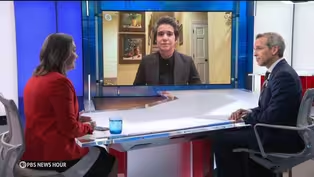
U.S. sees sharp decline in murders and other crimes in 2024
Clip: 12/30/2024 | 6m 43sVideo has Closed Captions
U.S. sees sharp decline in murders and other crimes in 2024
The number of murders in the U.S. is declining at a rapid pace. While crime was a central focus of the election, with President-elect Trump alleging it was out of control in many cities, other crimes also saw declines. William Brangham discussed what the data tells us with Jeff Asher, the co-founder of AH Datalytics and creator of the Real-Time Crime Index.
Problems playing video? | Closed Captioning Feedback
Problems playing video? | Closed Captioning Feedback
Major corporate funding for the PBS News Hour is provided by BDO, BNSF, Consumer Cellular, American Cruise Lines, and Raymond James. Funding for the PBS NewsHour Weekend is provided by...

U.S. sees sharp decline in murders and other crimes in 2024
Clip: 12/30/2024 | 6m 43sVideo has Closed Captions
The number of murders in the U.S. is declining at a rapid pace. While crime was a central focus of the election, with President-elect Trump alleging it was out of control in many cities, other crimes also saw declines. William Brangham discussed what the data tells us with Jeff Asher, the co-founder of AH Datalytics and creator of the Real-Time Crime Index.
Problems playing video? | Closed Captioning Feedback
How to Watch PBS News Hour
PBS News Hour is available to stream on pbs.org and the free PBS App, available on iPhone, Apple TV, Android TV, Android smartphones, Amazon Fire TV, Amazon Fire Tablet, Roku, Samsung Smart TV, and Vizio.
Providing Support for PBS.org
Learn Moreabout PBS online sponsorshipNICK SCHIFRIN: There is new data out that show the number of murders in this country is declining rapidly.
Crime was, of course, a central focus of the presidential election, with president-elect Trump portraying crime as out of control, and a majority of Americans believe that crime is increasing.
William Brangham is here with a look at what the numbers tell us -- William.
WILLIAM BRANGHAM: Nick, data collected from hundreds of law enforcement agencies show the murder rate dropped 16 percent compared to last year.
In San Francisco, homicides have fallen by a third.
Chicago recorded its lowest number of murders since 2019.
And rates of other crimes also fell.
Car thefts declined by roughly 20 percent.
For a closer look at what this means, we are joined by crime data analyst Jeff Asher.
He's the co-founder of AH Datalytics and creator of the Real-Time Crime Index.
Jeff Asher, so good to have you on the program.
When you look at all of this data that you analyzed, what stood out to you the most?
JEFF ASHER, Crime Analyst: I think the scope of the decline in murder stands out, certainly.
Right now, we have over 300 cities' worth of data through October showing murder down 16 percent.
Last year, the FBI had murdered down 12 percent.
For some context, the largest one-year decline ever recorded prior to last year was a 9 percent decline in 1996.
So it's not just that we're seeing a decline in murder.
It's not just that we're seeing murder relatively returning to where it was pre-pandemic, but we're seeing by far the fastest one-year declines last year and then again this year.
And it's been a phenomenal trend to be able to follow.
WILLIAM BRANGHAM: What is your understanding as to what is the most plausible explanation for what is driving this decline?
JEFF ASHER: I think the most plausible explanation is a combination of, one, just sort of everyday life getting back to normal, the stresses specific to the pandemic going away, and, two, a lot of the tools that we would ordinarily use, both policing and non-policing, to interrupt these cycles of violence which sort of erupted in the summer of 2020, we didn't have those tools in 2020 and 2021 and even much of 2022.
Now we have those tools at our disposal.
And in a lot of cities, we're seeing murder and gun violence return to and even exceed where it was pre-pandemic.
WILLIAM BRANGHAM: We're seeing also, as I mentioned, declines in other types of crimes, but overall crime declines, they were not universal.
There are some places that saw either a plateauing or an uptick.
Isn't that right?
JEFF ASHER: Sure.
I think we're looking at places like Charlotte, North Carolina, Baton Rouge, Louisiana, that had increasing murders, but for the most part those are the outliers, and they're notable because they're the outliers.
I believe, in the latest Real-Time Crime Index, we had 40 cities that had seen a double-digit decline in murders and only five cities that had seen a double-digit increase.
There's other types of crime that are maybe not seen as significant declines in terms of robbery and aggravated assault.
We're seeing significant declines in burglary, theft and a huge decline in motor vehicle theft after four years of increases.
So, yes, you can always point to things that maybe are either around even or even increasing in various cities, but with the majority of cities, the pattern tends to be decreases across the board.
WILLIAM BRANGHAM: Your analysis and all of the work that you do is clearly built on giving the average citizen a better window into what crime really does look like, both nationally and in their own city.
But, as you know, the perception of crime, people believe the opposite of what your data indicate.
How do you explain that?
JEFF ASHER: I think there's lots of little things that add up.
The first is that there's a data vacuum.
We don't have a lot of good, strong data, and that's the vacuum that we're hoping that projects like the Real-Time Crime Index can fill.
The FBI doesn't put out its year-end numbers until nine months after the most recent year ended.
So, one, you're asking people to essentially not use data and use anecdotes, and they're always going to have a bias towards how many murders have I seen on the news recently, rather than how many murders did I see last year at this time.
I think other challenges of the media doesn't cover the planes that land, there's rarely stories and I have done far fewer of these interviews where you're talking about declines in murder, even though it's a record decline, than were being done in 2020 and 2021, when we were seeing big increases in murder, big increases in gun violence.
And then you talked about at the beginning partisanship is playing a role; 90 percent of Republicans, 28 percent of Democrats and 60-something percent of independents think that crime rose over the last year.
And we're not seeing necessarily enormous just crime disappearing from American society.
So you would expect to see maybe 40, maybe 50 percent of the public thinking crime rose.
That you have this enormous gap between how Democrats and Republicans see perceptions suggest that they're being fed very different stories about what's actually happening in terms of crime in the country.
WILLIAM BRANGHAM: What is your sense as far as the practical impact of people not understanding reality with regards to crime?
I mean, what differences it make?
JEFF ASHER: Well, I think it has enormous differences in terms of, one, it's not healthy for people to be afraid.
It's not healthy for people to think that they're going to get mugged every day or that they live in some crime-ridden dumpster that nobody would want to live in, when reality is things may be in their city getting a lot better.
I think the other real challenge is that, if we create a world where either crime is rising or the data is wrong, then we're never able to understand, why are things getting better?
Is it something we're doing?
Is it randomness?
Is it a policy that nobody's thinking of that's having an effect that we didn't expect?
How can we understand successes is just as important as how can we identify and reverse failures, because, if we're having successful reduction policies, it's really a shame on us if we let this moment pass without seeing why these are happening and what we can do to extend it and what we can do to make this happen in places that are not currently seeing declines.
WILLIAM BRANGHAM: All right, Jeff Asher of the Real-Time Crime Index, thank you so much for your time.
JEFF ASHER: Thanks for having me.
Critics reveal their picks for the best books of 2024
Video has Closed Captions
Clip: 12/30/2024 | 9m 3s | Critics reveal their picks for the best and most important books of 2024 (9m 3s)
Jimmy Carter remembered as humanitarian and statesman
Video has Closed Captions
Clip: 12/30/2024 | 2m 52s | Jimmy Carter remembered as humanitarian and statesman (2m 52s)
A look at Carter's accomplishments and human rights legacy
Video has Closed Captions
Clip: 12/30/2024 | 10m 15s | A look at Carter's accomplishments as president and his legacy as a human rights champion (10m 15s)
Social media trend encourages young people to buy less
Video has Closed Captions
Clip: 12/30/2024 | 6m 49s | Social media trend encourages young people to buy less and reconsider their consumption (6m 49s)
Tamara Keith and Amy Walter on Trump defining Biden's legacy
Video has Closed Captions
Clip: 12/30/2024 | 9m 16s | Tamara Keith and Amy Walter on how Trump's 2nd term could define Biden's legacy (9m 16s)
Providing Support for PBS.org
Learn Moreabout PBS online sponsorship
- News and Public Affairs

FRONTLINE is investigative journalism that questions, explains and changes our world.

- News and Public Affairs

Amanpour and Company features conversations with leaders and decision makers.












Support for PBS provided by:
Major corporate funding for the PBS News Hour is provided by BDO, BNSF, Consumer Cellular, American Cruise Lines, and Raymond James. Funding for the PBS NewsHour Weekend is provided by...




